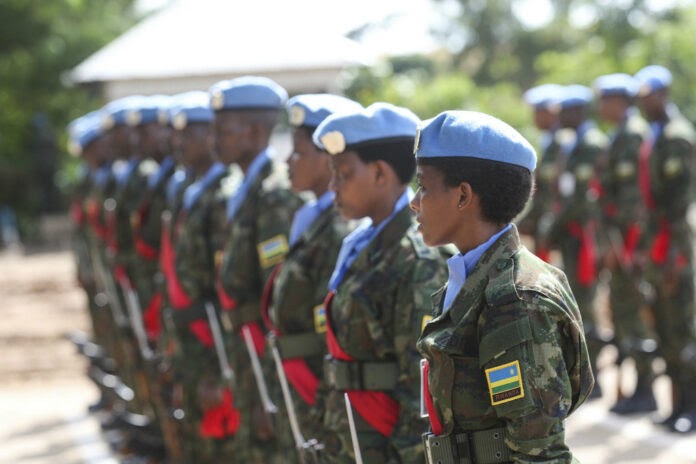300 Rwandan Soldiers Arrive Central African Republic To Reinforce UN Forces
The Rwandan soldiers will join the MINUSCA forces in CAR, helping to combat rebel groups.

A new contingent of 300 Rwandan soldiers Tuesday Aug. 3, 2021 arrived in Bangui, capital of the Central African Republic to join the United Nations Multidimensional Integrated Stabilization Mission (MINUSCA) in the country.
According to MINUSCA, the main detail of the new Rwandan contingent would be to secure the highway which is the main supply route linking Bangui the capital to Cameroon.
The deployment of the Rwandan troops follows a UN Security Council resolution of March 12, 2021 providing for the progressive augmentation of the MINUSCA forces by about 3,000 Blue Helmets.
Classified as the second least developed country in the world by the UN, the Central African Republic has been ravaged by civil war since 2013.
“It is the first part of the unit which arrived today to secure the Bangui-Beloko highway at the Cameroon border,” declared Abdoulaziz Fall, the MINUSCA spokesperson, adding that the Rwandan soldiers would be in the country for one year.
“The rest of the battalion numbering 450 soldiers will arrive at the end of the year,” the UN official revealed.
The Central African Republic witnessed an increase in violence in mid-December 2020 when a coalition of six of the strongest armed groups that controlled two thirds of the country launched an offensive against the regime of President Faustin Archange Touadera.
The assault on the capital Bangui was halted by a better equipped team consisting of 12,000 United Nations Blue Helmets of MINUSCA present in the country since 2014 as well as hundreds of Rwandan soldiers and Russian paramilitary combatants dispatched to the country to rescue the Touadera regime.
Unable to overthrow the Touadera regime and prevent his re-election, the Coalition of Patriots for Change (CPC) tried to block traffic on the vital number 1 and 3 national highways which link the capital Bangui to neighbouring Cameroon in a bid to asphyxiate Bangui. The rebels eventually took over temporary control of certain towns.
Government forces have since the beginning of the year taken over the agglomerations from the rebels as well as a good part of the two-thirds of the country which they had controlled for several years.
Rebel attacks however remain frequent and have spiked over the last weeks. Last Saturday, at least six civilians were killed in the northwest of the country close to the border with Cameroon.
Support Our Journalism
There are millions of ordinary people affected by conflict in Africa whose stories are missing in the mainstream media. HumAngle is determined to tell those challenging and under-reported stories, hoping that the people impacted by these conflicts will find the safety and security they deserve.
To ensure that we continue to provide public service coverage, we have a small favour to ask you. We want you to be part of our journalistic endeavour by contributing a token to us.
Your donation will further promote a robust, free, and independent media.
Donate HereStay Closer To The Stories That Matter




